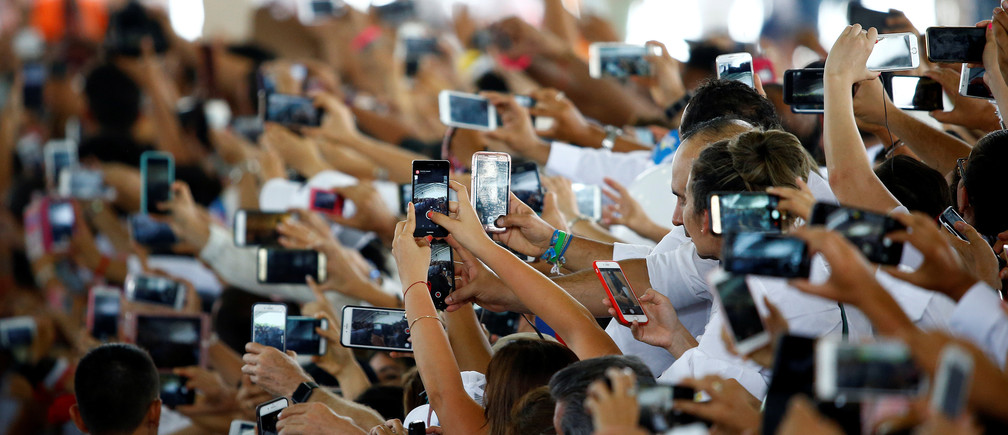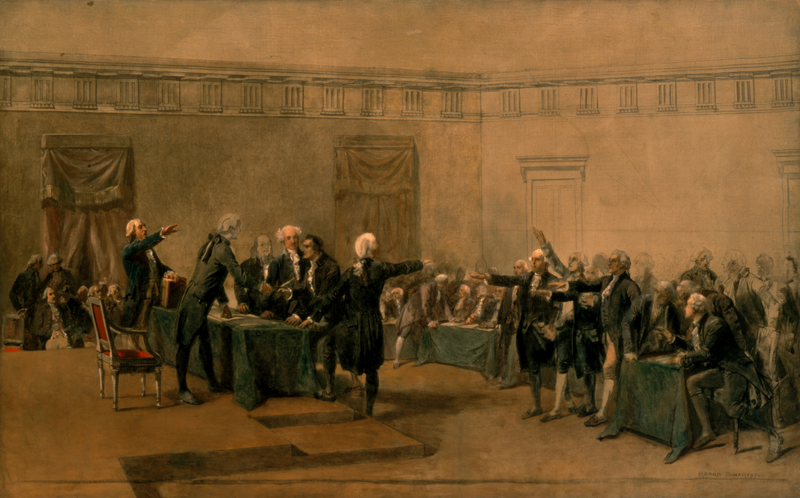Democracy and despotism in a digital age.
The Coming Strangulation of Free Speech

Collusion between Big Tech and Western governments is a growing threat.
It’s the First Amendment for a reason: free speech is a fundamental prerequisite for liberal democracy. But The Guardian, with logic that Stalin would have appreciated, insists the concern over free speech has been “concocted” by the Right. This is one example of many that shows the assault on free speech today primarily comes from the very people—the legacy media, academia, and progressives—who once championed unencumbered dialogue.
Given the increasing likelihood of a Kamala Harris presidency, the outlook for free speech could turn even more dismal. As California’s attorney general, when it came to privacy legislation, she supported policies favored by her tech backers, and also evidenced little interest in protecting pivotal rights of free societies such as due process.
Under Harris, the censorship regime would likely get even stronger. She has spoken openly about wanting to “censor misinformation and hate.” Already under Biden, there has been strong support for suppressing online dissent, even proposing to create a “disinformation” board. This likely would be used not only to cover COVID-related issues but also climate change, with the Biden Administration’s top climate adviser Gina McCarthy casting censorship as a “health issue.”
To be sure, the U.S. will have to get much worse to beat our erstwhile democratic allies’ abandonment of free speech; unlike the U.S., the U.K. has no First Amendment. Even as authoritarian regimes are expanding all around the world, notes Freedom House, other Western nations seem to be tilting toward greater restraints on free expression, with “hate speech” laws already surfacing in Scotland, Ireland, Australia, and Canada.
Britain, the historic incubator of basic freedom, has become ever more oppressive. According to a December 2021YouGov poll, over two in five now think protecting people from offensive remarks is more important than protecting free speech. Even under Tory rule, the state has been putting people in jail for provocative social media posts. During the pandemic, the BBC, as well as Facebook and Google, worked with the government to squelch dissenting views on COVID.
It was also under the Tories that Brexit campaigner and persistent critic Nigel Farage found that his bank tried to close his account because of his “problematic” views. While the U.K.’s then-Conservative government publicly denounced the practice of debanking, it quietly pushed for the state to monitor bank accounts. In Scotland, the leftist SNP is adopting a law that encourages people to report disliked speech to the police.
In a preview of what we may see here under Harris, things have managed to get markedly worse under the new Labour government in Britain. Even as anti-Israel protestors and Muslim radicals own the streets, the regime’s attention—particularly after the recent race riots—has been on the “far-right,” with surveillance and banning. Labour is actively amplifying thought repression—this in the same country where many of our ideas about free societies originated.
Canada, long seen as the epitome of reasonable governance, has gone down a similar path. In 2022, Prime Minister Justin Trudeau blocked the bank accounts of truckers who protested against his COVID policies. For good measure, he even denounced them as neo-Nazis, even though many were ethnic minorities.
Trudeau has recently dialed up even greater repression. He proposed imposing house arrest on people associated with “hateful” online postings. In the case of the most heinous speech like advocating genocide, lifetime imprisonment could be inflicted. Lighter sentences or simple house arrest could be applied to anything that censors regard as hate speech, which could include such things as “misgendering” people or criticizing any aspect of Islam.
Spiked rightly compared this to the movie Minority Report, based on Philip K. Dick’s 1956 novel, “in which a ‘Precrime’ police division uses intelligence from mutants known as ‘precogs’ to arrest people before they’ve committed an offence.” Margaret Atwood, author of The Handmaid’s Tale, has criticized Canada’s policies as “Orwellian.”
Despite the First Amendment, U.S. government officials have pressured companies like Meta to censor unwanted content, notably on the COVID pandemic. The big social media platforms also collaborated with the Biden campaign to dismiss Hunter Biden’s laptop as “Russian misinformation” even though it turned out to be the genuine article, as the FBI already knew.
This pattern has surfaced again this year. Until recently, Meta banned Instagram accounts tied to Robert F. Kennedy, Jr.’s now-cancelled independent presidential campaign. LinkedIn also briefly suspended the account of GOP presidential hopeful Vivek Ramaswamy. Not surprisingly, trust in the instruments of surveillance, like the once highly regarded FBI, has plummeted while almost two in three Americans, including majorities in both parties, fear the country is becoming “a police state.”
More worrisome still, the drive to censor speech has its strongest support among America’s best-educated urban elites, the base for the progressive Democratic Party. A recent Rasmussen poll suggests that those with elite educations and in highly paid professions believe Americans have far too much freedom in their daily lives, including in the meat and gas they consume (most other Americans feel differently on this question).
At the same time, similarly-minded progressives increasingly control what happens in our museums, while woke censors proliferate at large publishing firms on both sides of the Atlantic. Perhaps more remarkable, the journalistic profession itself, particularly at the elite level, largely follows a single orthodoxy that often defines its output. Although even in the past most reporters were not conservatives, the tilt today is extreme. By 2018, barely 7% of U.S. reporters identified as Republicans, and some 97% of all political donations from journalists went to Democrats.
In an atmosphere of group think, the cancelling of discordant thoughts comes distressingly often from places like the New York Times, NPR, and the BBC. Even The Wall Street Journal, the last holdover of old-fashioned journalism, may also be headed this direction, as some editors now lament. As veteran journalist Jeff Gerth has pointed out, journalism schools churn out reporters who are easily swayed by bogus stories like Russiagate because it fits their ideology. This shift is explored in a 2019 Rand study, which fingers journalism schools as a source of what they call “truth decay.”
Similar patterns are found in other Western countries, too. In France, two-thirds of journalists favor the socialist Left, and sometimes spend considerable effort apologizing for anything that might offend certain designated victim groups. In Britain, more than half of journalists identify as being on the Left, while just under a quarter are on the Right.
Yet the biggest problem lies in the concentrated power of the Big Tech platforms that control the key information pipelines. Nearly two thirds of U.S. young adults now get their news primarily through social media. These platforms—with the notable exception of X—are overseen by those who occupy the commanding heights of our culture and censor views that are unpopular among progressives.
For years controllers at Facebook and Twitter “curated” the content on their sites, and even eliminated views they found objectionable, which according to former employees tended to be conservative views. Algorithms intended to screen out “hate groups” often spread a wider net, noted one observer, since the programmers have trouble distinguishing between “hate groups” and those that conflict with the dominant progressive culture of Silicon Valley. Over 70% of Americans believe that social media platforms “censor political views,” according to a recent Pew study.
Particularly alarming, both here and abroad, is the trend of these firms working in tandem with the state. This emerged during the COVID era, where dissenting views were censored or marked as faulty at the behest of federal officials, a regime that one U.S. federal judge compared with “the Orwellian Ministry of Truth.”
In the future, the censorship around the pandemic could be seen by some as a fire drill for regulating the lives of ordinary citizens in even more exacting ways. The dissenting views of climate policy skeptics—even when highly credentialed—could be wiped out as “misinformation.” The curators of social media platforms like Reddit have already banned climate skeptics from their science pages, and Meta recently censored well-supported articles that detail the impact offshore wind turbines are having on whales.
This push by the climate lobby has been aided by non-profits like the Rockefeller Foundation, along with the Chan Zuckerberg Initiative, which now funds “reporters” at once-respected places like the Associated Press and NPR.
The collusion of media, the oligarchy, and the state could become more common, particularly if the Democrats win the White House and Congress. One potential model is being developed in California, as the state is negotiating with Google, which was recently declared a monopoly by a federal judge because it controls over 90% of the global search market, to hand $250 million to hard-hit local newsrooms that have seen their content pilfered for free, particularly in the runup to building AI models.
The idea that Google, with a history of censorship and pandering to left-wing causes, will be funding newsrooms should terrify reporters. Even the normally party-line LA Times denounced the deal as “bowing” to Google and other AI developers; the media guild accurately characterized it as “a shakedown.”
Under this arrangement, there’s not likely to be much coverage of tech abuses, climate skeptics, or free speech advocates; instead, the media will become an even more reliable funnel for progressive views. To assure this, the California plan would hand money to the social-justice-warrior-oriented journalism school at UC Berkeley. To be sure, ethnic journalism groups, which tend to be far-left, are also being included in the decision-making.
The California scenario is a warning about where media and “truth” may end up. Schooled in the indoctrination camps and saturated by social media, young people already tend to be very lukewarm about protecting free speech. The new regime’s thinking can be seen in comments from Supreme Court Justice Ketanji Brown Jackson, whose “biggest concern” is that the “First Amendment [is] hamstringing the government in significant ways.”
But to be fair, the assault on free speech is not restricted to the progressive Left. Republicans in Iowa seeking to ban Aldous Huxley’s Brave New World—a great, prophetic book I have used as the basis for a class—reveals an intellectually demented perspective. New Right parties in Italy, France, Sweden, Greece, Switzerland, and Spain include some who openly admire Vladimir Putin and Hungary’s proudly illiberal Viktor Orbán. These are not exactly devotees of free speech.
Yet even in the case of a conservative win in November, the influence of dictator worshipers like Tucker Carlson may not be prominent. For one thing, the Right fears, and rightfully so, that the expansion of federal and state power will almost inevitably favor the Left given the proclivities of our nomenklatura—even as they worry about Trump’s own media agenda.
Ultimately, the more critical, long-term issue is not ideology but the power of a handful of social and legacy media firms that exercise increasing control over the means of communication. It is highly unlikely that Harris, whose whole career has been nurtured and largely manufactured by the tech and media elites, will look favorably on attempts to curb Big Tech monopolies by states like Texas. In fact, under Harris, the monopolies would likely get even bigger. Key Harris backers like LinkedIn founder and big time bankroller Reid Hoffman, along with other luminaries, openly seek to dump Biden’s trust-buster Lina Khan.
The key battleground now is X, which has already been banned in Brazil, a nominal democracy, and is under increased pressure from regulators in the U.K. and E.U. Removing or severely sanctioning X, something conceivable under a future Democratic administration, would be the first step toward killing off the First Amendment in all but name. The recent arrest of Telegram CEO Pavel Durov in France suggests a model for a state that treats platforms that don’t go along as pariahs.
Yet it’s far from clear that these gambits will work. Overall, the mainstream media is losing the trust of the public, notes Gallup, which is dropping among all age groups according to Pew. New media entities both here and in the U.K. continue to emerge, offering different perspectives that challenges party line journalism.
Ultimately, the issue goes well beyond partisan politics. Liberalism and democracy without free speech is little more than a sham. The pressure now threatens to create a media and speech culture more akin to the People’s Republic of China than what the American Founders bequeathed to us.
The American Mind presents a range of perspectives. Views are writers’ own and do not necessarily represent those of The Claremont Institute.
The American Mind is a publication of the Claremont Institute, a non-profit 501(c)(3) organization, dedicated to restoring the principles of the American Founding to their rightful, preeminent authority in our national life. Interested in supporting our work? Gifts to the Claremont Institute are tax-deductible.
Part I: Unfettered reason cannot conserve anything.
One dose will erase your whole political mind.






